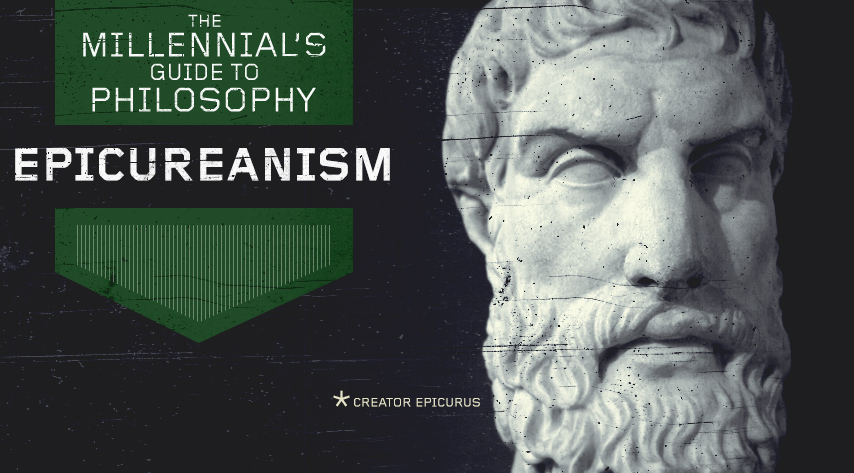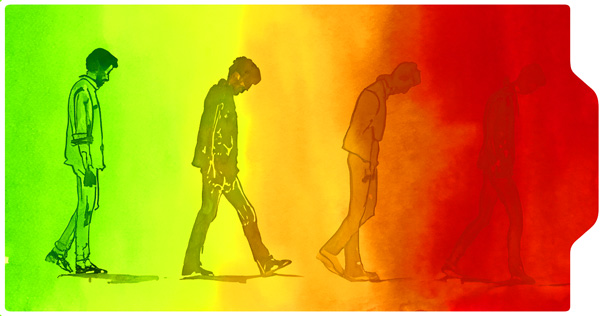“Imagine there's no heaven/It's easy if you try/No hell below us/Above us only sky/Imagine all the people/Living for today…”
Those are the opening lyrics to John Lennon’s masterpiece “Imagine”, and while the song was written in May of 1971 the sentiment behind the piece stretches back over 2,000 years to when an ancient Athenian named Epicurus argued that life was too short to waste on trying to be right instead of trying to be happy.
Who Thought It Up
Epicureanism takes its name from its creator, Epicurus, an ancient Athenian thinker who founded the philosophy as a grounded and realistic response to what he saw as the pointlessly abstract debates of the time. In a day and age when philosophers deliberated endlessly on the forms and functions of music, Epicurus alone argued that it was enough to simply enjoy it – it and food, wine, good company, fresh air, and all the pleasures that life had to offer.
While Epicurean philosophy itself died out with the Romans, Epicurean thought and principles have survived the ages in one shape or another, echoed from the writings of Ralph Waldo Emerson and Thoreau to the lyrics of Bobby McFerrin and the politics of Christopher Hitchens.
What It’s All About
Chance
“Don't fear god,
Don't worry about death;
What is good is easy to get, and
What is terrible is easy to endure.”
-Epicurus, “The Four Part Cure”
In opposition to the philosophers of the time who were obsessed with fate, purpose, and divine intervention, the Epicureans argued that it was chance, not the gods, who dictated all things. Among the earliest advocates of the theory that the universe is comprised entirely of building blocks called “atoms”, Epicurus and his followers established a philosophy based upon what they understood as the natural world – one without laws or mandates handed down from powers beyond human comprehension. Storms, earthquakes, famine, disease, and ultimately death were all solely products of a chaotic and disorganized world.
Instead of preaching doom and gloom and nihilism, the Epicureans’ response was simply “Why worry?” With no gods to offend and no afterlife to prepare for you might as well enjoy the time you’ve been given. As the great Epicurean poet Lucretius said, “By protracting life, we do not deduct one jot from the duration of death,” so eat, drink, be merry, and let the chips fall where they may.
Moderation
“Luxurious food and drinks, in no way protect you from harm. Wealth beyond what is natural, is no more use than an overflowing container. Real value is not generated by theaters, and baths, perfumes or ointments, but by philosophy.”
-Attributed to Epicurus
“Epicurean” as an adjective is typically used to describe lavish or hedonistic excess. The last few generations of Epicurus’s disciples spent the final days of the Roman Empire in a steady conga line of drunken, debauched orgies, and it’s these images of wild abandon we usually associate with the philosophy. After all, between that and the Epicureans’ general skepticism of anything beyond the material world, it doesn’t seem like a stretch that they’d be riding out the clock rushing from one party to the next.
However, this just isn’t the case.
What Epicurus (and the vast majority of Epicureans) actually taught was not the pursuit of pleasure but rather the avoidance of pain, a concept they called “aponia”. Anything that’s going to cause you regret the day after you do it isn’t worth doing, whether it’s gorging yourself on a rum-soaked cheesecake topped with imported caviar or simply cracking open one beer too many. Moderation in all things will ultimately lead to…
The Good Life
“It is impossible to live a pleasant life without living wisely and honorably and justly, and it is impossible to live wisely and honorably and justly without living pleasantly. Whenever any one of these is lacking, when, for instance, the man is not able to live wisely, though he lives honorably and justly, it is impossible for him to live a pleasant life.”
-Epicurus, “Principal Doctrines”
Hand in hand with their concept of “aponia” was the Epicurean adherence to “ataraxia”, a state which translates loosely to “being stress-free”. Fear was considered by the Epicureans to be the root of most bad behavior in the world, resulting in either panicked, hedonistic excess or in an attempt to cut oneself off from any feeling or emotion (a charge they frequently leveled against their chief rivals, the Stoics). Epicureans argued that simplicity, relaxation, and gaining an understanding of one’s place in the universe would produce this sense of peace. If you think this sounds a lot like the principles advocated by Zen Buddhism and other Eastern philosophies, you’d be right – while Epicureanism is by far more materialistic, in application there tends to be quite a lot of overlap between them. Chances are also pretty high that you’ve heard this same concept in the “Serenity Prayer” used by most 12-Step Programs (“God, grant me the serenity to accept the things I cannot change/The courage to change the things I can/And wisdom to know the difference”).
In short, a good attitude can help you enjoy good food, good food will help you enjoy good wine, and all three are all the better when you have good friends to share them with. And for the Epicureans, it’s friends that rank above all else.
Friendship
“Of all the means which wisdom acquires to ensure happiness throughout the whole of life, by far the most important is friendship.”
-Epicurus, “Principal Doctrines”
Friendship was for the Epicureans the final and most essential part of the equation for a good life. The simplest pleasure is increased exponentially when enjoyed in good company and the worst hardship is lessened by sharing the burden with friends. Life, in all its chaos, is made bearable by us never having to endure it alone.
Indeed, this concept was expanded upon by the Epicureans who saw it as not applying exclusively to the people you keep company with, but as having implications for every human being alive. While other philosophies tended to emphasize individualism – responsibility first and foremost to self – Epicureans maintained that the same principle applied to one’s friends should be applied to everyone. Understanding that what is pleasurable to some is painful to others, providing respect to all with the expectation of respect in return, doing unto others what you would have done to yourself – these are all the basis for ensuring you can live the life you want to live. It’s actually the basis for the concept of the “social contract,” the fundamental and unspoken rules with which every society operates. Again, you’ll hear this echoed in John Dunn’s famous “Meditation 27” or “No Man Is An Island” poem. “Any man's death diminishes me, Because I am involved in mankind…”
What It Means For Us
The years immediately following college will be some of the toughest in your life. Chances are that money will be short, the work day will be long, and most everything which you took for granted a few years ago will be distant luxuries. It’s easy to feel down when you’re chewing through your 5th bowl of ramen this week, sitting in a crummy little apartment with the lights off to save on electricity.
Now are you going to sit there in the dark, or are you going to take advantage of the opportunity and do some stargazing? It’s times like these when Epicureanism should be most appealing – think of it almost as a Midas touch, letting you turn what little you have into all that you need. Lucretius nailed it again when he said, “man’s greatest wealth is to live on a little with a contented mind; for a little is never lacking.”
We’re not talking about a philosophy designed to help you get through the bad times, we’re talking about one built to dispel them entirely. Learn how to take joy in the little things and you’ll never need anything else. You’re alive, you’re free, you’re surrounded by people who you care about and who care about you (or if you aren’t, Brandon Stanfill’s article on the subject is a great place to get started).
Required Reading
De Rerum Natura, or “On The Nature of Things by Lucretius – I’m not going to lie, this isn’t an easy read. Lucretius attempts to combine philosophy, religious criticism, and scientific theory into a massive arc of poetry. Nevertheless, armed with a trusty study guide, conquering this tome will give you the groundwork for most every Epicurean text written.
Principal Doctrines by Epicurus – A refreshingly simple change of pace from Lucretius, Epicurus’s 40 central maxims are laid out in terms so simple and short you could probably scribble all of them down on the back of a cocktail napkin.
The Adventures of Huckleberry Finn by Mark Twain – Written centuries after the last of Epicurean philosophers had died, Mark Twain’s classic nevertheless provides a great example of Epicureanism put into action. Giving us some of the most vivid images of simple contentedness in Western literature, we’re shown characters happy to simply drift down the Mississippi on a raft – not a cent to their names and still happy and free. As Jim himself would say, “…I’s rich now, come to look at it. I owns mysef [sic]”…
The Millennial’s Guide to Philosophy
- The Millennial's Guide to Philosophy: Stoicism
- The Millennial’s Guide to Philosophy: Epicureanism
- The Millennial’s Guide to Philosophy: Nietzsche
- The Millennial’s Guide to Philosophy: Postmodernism
- The Millennial’s Guide to Philosophy: Confucianism
- The Millennial’s Guide to Philosophy: Taoism
- The Millennial’s Guide to Philosophy: Sartre
- The Millennial’s Guide to Philosophy: Kierkegaard
- The Millennial’s Guide to Philosophy: Camus
















